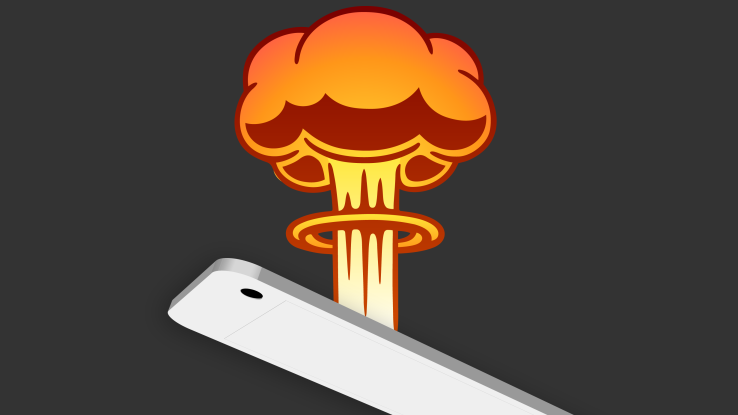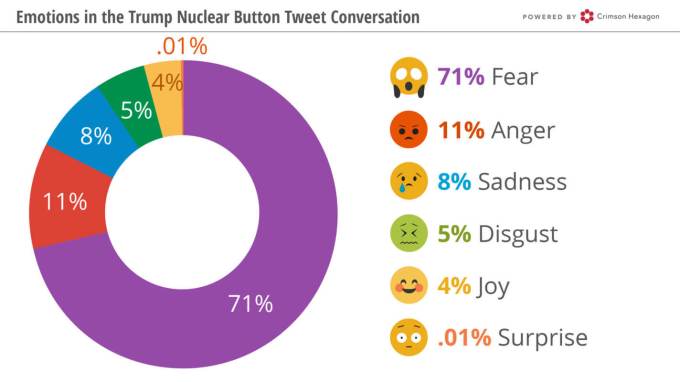

Trump’s tweet raising the prospect of nuclear war with North Korea isn’t in violation of Twitter’s guidelines, the company says, and will remain online. In the tweet, Trump boasted that his “Nuclear Button” is “much bigger” and “more powerful” than the one belonging to North Korean leader Kim Jong Un – a combative and childish taunt that raises serious questions about Trump’s fitness for office, as well as to what extent Twitter is complicit in allowing him to publish threats of this nature to its platform.
Trump’s tweet – a response to Kim Jong Un’s statement about his own nuclear arsenal – has around 353,000 “Likes” on Twitter. That makes it one of the most-engaged with tweets in recent days, including Trump’s year-end tweet wishing everyone – “even Fake News Media” – a Happy New Year. That tweet had neared 200,000 Likes, while another Fake News-related tweet the day prior had topped 200,000.
The Like count doesn’t necessarily indicate endorsement, of course. People tend to use the Like button as a bookmarking feature, in many cases – especially when needing to reference a notable tweet like this.
In addition, Trump’s North Korea-related tweets get nearly 2.5x as much traction in Replies as all his tweets, notes social media insights firm Crimson Hexagon. And yesterday’s nuclear button tweet also saw more than 2x traction in Replies than all Trump’s North Korea-related tweets since July 1, 2017.

Yesterday’s nuclear button had replies with negative sentiment (47%) that was pretty much on par with negative sentiment of replies to all Trump’s tweets, but a bit more negative than his North Korea-related tweets (42%).
A number of users reported the tweet to Twitter, with the expectation that threatening a war one is capable of starting should violate Twitter’s revised Terms of Service, given the company’s recent crackdown on violent threats.
Twitter, in December, began enforcing new rules around violent and hateful content posted to its platform, as part of the company’s broader agenda to craft new policies aimed at reducing the amount of online abuse, hate speech, violent threats, and harassment associated with its service.
Specifically, Twitter’s rule about violent threats, reads as follows:
Twitter Rules: You may not make specific threats of violence or wish for the serious physical harm, death, or disease of an individual or group of people.
Rationale
We want Twitter to be a place where people feel safe to freely express themselves. Thus, we will not tolerate behavior that encourages or incites violence against a specific person or group of people. We also take action against content that glorifies acts of violence in a manner that may inspire others to replicate those violent acts and cause real offline danger, or where people were targeted because of their potential membership in a protected category.
When this applies
Tweets that violate this policy contain violent threats or glorify violence.
However, Twitter responded to users who reported Trump’s tweet as a violent threat that the tweet wasn’t an issue.
Users were informed the company reviewed the case and “found that there was no violation of the Twitter Rules against abusive behavior.”
The email then offers some general guidelines about how Twitter comes to its decisions, which don’t really apply to the Trump tweet – like how tweets can sometimes appear to be abusive when viewed in isolation, but not when they’re seen as part of a larger conversation taking place, for example.

When asked for comment about its decision, Twitter pointed to the email reports it sent. It’s not offering a public statement at this time, though that could still change.
The issue is that Twitter’s rules don’t apply to whatever Trump posts because of who he is. This, combined with another exception Twitter recently carved out for governments and military, allows Twitter to wash its hands of the matter.
For starters, there’s the “newsworthiness” of Trump’s statements. No matter what those statements are, Twitter allows his tweets to remain online because he’s the U.S. President.
This situation has come up before – in fact, it came up with regard to another Trump tweet about North Korea. Back in September 2017, North Korea’s top diplomat described President Donald Trump’s tweets about the country then as a “declaration of war.” This prompted Twitter to further explain its stance on the matter.
In a thread posted to its service, the company’s global public policy team wrote that it holds all accounts to the same rules, but also considers other factors when assessing whether tweets violate those rules.
“Among the considerations is ‘newsworthiness’ and whether a tweet is of public interest,” Twitter explained in the thread. “This has long been internal policy and we’ll soon update our public-facing rules to reflect it. We need to do better on this, and will. Twitter is committed to transparency and keeping people informed about what’s happening in the world,” the company said.
In December, Twitter further distanced itself from having to police Trump’s tweets by making military and government entities an exemption from its rules about violent threats and the promotion of violence on Twitter.
This part of Twitter’s rules states:
Exceptions will be considered for groups that have reformed or are currently engaging in a peaceful resolution process, as well as groups with representatives elected to public office through democratic elections. This policy does not apply to military or government entities.
While Twitter’s rules won’t hold Trump accountable, there are some people who will. An activist group called Resistance SF believes Twitter is to blame for giving Trump a platform. The group is planning to protest Twitter’s San Francisco headquarters on Wednesday because of Twitter’s refusal to ban Trump from the service.
“Trump or Jack [Dorsey, Twitter CEO] must go,” the Facebook event page for the protest reads.
The group also took credit for messages projected on Twitter’s HQ last night, one of which reads “@jack is #complicit.” (The group says its projector rotates through messages, usually every 30 to 60 minutes).
Whether or not you personally agree with Twitter’s position here, it’s clear that Trump’s postings will cause a continuous headache for Twitter. Yet, at the same time, Trump’s tweets are helping to boost Twitter’s user numbers (and therefore its revenue) as more people tune in to watch the drama unfold on its service.
Twitter, then, is in the awkward position of both benefiting from and being attacked for its decision to continue to host Trump’s account. Of course, if Twitter banned Trump – effectively taking a political (or some would say, moral) position on the matter – there would be uproar about that, too.

